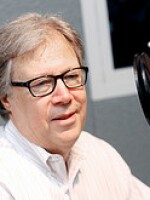Prince, who received approval from the classical establishment, is now getting it from the musicians themselves.
Last week, Alex Ross, the great classical music critic of The New Yorker, offered a vivid recollection of a concert he saw back in 2004.
He described it as “one of the most staggering live performances I’ve ever seen.” He went on to say that the featured artist was “a profoundly musical being whose startling displays of virtuosity never lost sight of the fundamental harmonic landscape…”
The artist in question? Yo-Yo? Placido? Renee?
It was Prince.
Ross is not a guy who throws language around carelessly, so words like these make you sit up and take notice.
He goes on to direct the reader to other musicians and critics who have weighed in on the Prince phenomenon, including an uncharacteristically tender bit of vintage video testimony from Miles Davis.
I don’t want to pile on to the rapidly expanding mountain of Prince commentary, but I want to call attention to this one small, fascinating thing: the way so many classical music people have openly, sincerely, unashamedly, even proudly declared their deep respect for the work of the man who brought us “Little Red Corvette,” “Raspberry Beret,” “Sign O’ the Times” and, oh, several hundred other specimens that -- as the classical people themselves are telling us -- clearly go beyond the self-limiting designation of pop song.
Maybe we’re turning a page here -- to a generation of classical players who are no less committed to their art than their predecessors, but who also are more readily embracing the idea that classical music is not the only category worthy of being taken seriously.
In this respect, classical players are not different from the rest of us. It’s not enough that we love the music that we do. We want everyone else to love it, too. Further, we want them to acknowledge that the music is “important,” or, yes, sometimes even “classical.”

Richard Elliott, a professor of music at University of Sussex in England published a piece last week that proposed, in fact, that Prince should indeed be considered a classical musician.
I’m as prone to this tendency as anyone. I don’t know why it’s the case. Maybe we secretly worry that music is somehow frivolous and we want to be assured that if enough people see value in it, then it must have meaning after all.
We crave validation not only of the music itself but also of our feelings about it.
When I was a teenager and first began to obsess about the Beatles, I was outraged that most of the early media attention tended to be paid to the screaming, swooning girls rather than what I thought should have been the obvious central message: the fierce originality of the music.
It was hugely vindicating when, a little later, adults began to speak of that music with growing critical respect. It was especially thrilling, I recall, when Pauline Kael called “A Hard Day’s Night” one of the best films of 1964.
And I can still remember the deeply admiring review of “Rubber Soul” that ran in Stereo Review, a magazine that at the time was better known for passing judgment -- frequently stern and supercilious -- on new classical releases. Around the same time, Marshall McLuhan endeared himself to me with an essay that extolled the Beatles' “remarkable musicianship.”
With the reaction to David Bowie’s death in January, and now even more dramatically with the passing of Prince, what we’re seeing from many points within the classical establishment feels like the logical extension of that critical approval: validation from the musicians themselves.
And now that social media and Facebook in particular give us the capacity to hold a kind of running, real-time national conversation about things like this, the response is out there for all of us to see.
In my own circle, I’ve been touched, for instance, by the depth of feeling expressed in several posts by Monica Ellis, the distinguished bassoonist of the Imani Winds quintet.
I was also was impressed by the revelation offered by Robert deMaine, the dazzlingly gifted cellist who passed through Hartford years ago and now is principal cellist of the Los Angeles Philharmonic. He said, simply, that Prince, together with Frank Zappa, had been his formative musical idols.
The point is not that pop music and classical music (and for that matter jazz, film, and video game music) are now all equivalents, or somehow indistinguishable from one another. It’s that they can all be recognized as having legitimacy -- all, at their best, adding something decisive to the musical culture.
So if you want to claim to understand the music of our time, you will need to spend some time with the work of Ades, yes, and Adams, and Higdon, and Glass, and Reich.
But also, to take but one example, to spend time with His Royalness’ now-celebrated You Tube guitar solo on "While My Guitar Gently Weeps,” a display that one classical instrumentalist -- searching for the most reverential, idiomatic and validating term available -- called “ill.”
Reach Steve Metcalf at spmetcalf55@gmail.com.





